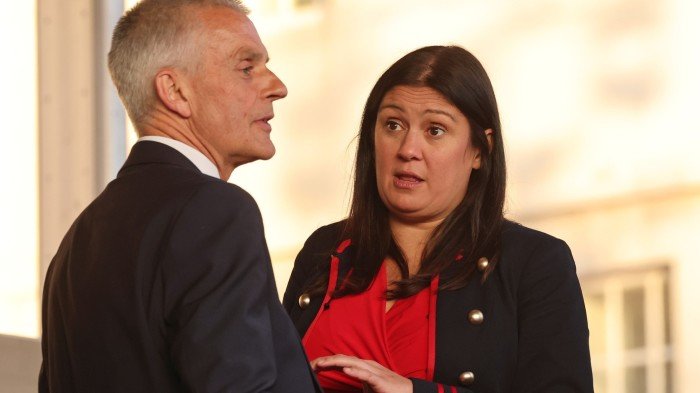Unlock the Editor’s Digest for free
Roula Khalaf, Editor of the FT, selects her favourite stories in this weekly newsletter.
The writer is a former controller of BBC Radio 4
Another day another crisis. The BBC can always be guaranteed to provide fodder for outrage — perceived bias in the corporation’s news coverage (the most reliable staple), egregiously misbehaving male stars, workplace bullying on wholesome family entertainment shows, the grizzly mess of Martin Bashir’s interview with Diana, Princess of Wales, Gary Lineker in all his social media glory.
To that list is now added the genuinely wretched failure to pull out of the live coverage of Bob Vylan’s antisemitic set-slash-rant at Glastonbury.
It’s a cornucopia of trouble — and the quick and easy conclusion is that the place must be going to the dogs. Again. Because the UK’s public service broadcaster, 103 years old, has so often been thought of as going to the dogs.
It lives in a state of near-constant crisis and many who work for it feel the burden. At any given moment, something, somewhere is about to go wrong — or so it often seems. Neurosis and defensiveness form part of the pathology of the institution.
The BBC’s survival, therefore, might be considered some kind of a freak. Sooner rather than later — or so say its many critics — the broadcaster should be pared back further (funding having been cut by 30 per cent in 15 years). Or perhaps we should be shot of it altogether. No more £174.50 for the compulsory licence fee — and then let the nation rejoice that the £3.7bn income every year for the BBC would no longer distort the market and constrain its many competitors.
But all of that is to miss the point. The BBC has not remained a central part of UK life and culture — gothic mistakes and all — because, over the decades, successive generations of those in power absent-mindedly forgot to abolish it.
Rather it exists because tens of millions use it every week — 35mn in the UK every day, where it is still the most trusted news source, and for good measure more than 450mn people listen to and watch its programmes around the world. Large parts of the public grumble about the BBC at least some of the time and some grumble all the time — but in the round people like it even more than they are annoyed by it.
Yes — they pay for it, but they are not forced to watch, listen or download. Some of the programmes might be not to my taste — or yours — but that is no reason to think it is performing badly. Either the BBC is providing all of its audiences with enough of value that is not junk, or it isn’t. That’s the central judgment that needs to be made. The crises command vast attention not least because the BBC provides so much of its own airspace and prominence to its woes. But reacting to every crisis as existential is not the way to assess the BBC’s successes and shortcomings.
Meanwhile, almost everyone is almost always cross. Politicians of all stripes, religious leaders, leaders, business panjandrums and most pundits. Lisa Nandy, the current secretary of state, declares herself unhappy with the director-general Tim Davie’s answers about Glastonbury. But there again no culture secretary ever has been happy with the BBC’s answers — certainly not publicly. This time she has thwacked the bosses a bit harder than normal by proclaiming the corporation has “a problem of leadership” — another view shared down the ages by all and sundry.
If something is awry then it stands to reason that the director-general of the day is not up to it, or the system of governance must be at fault, or the board of governors is asleep on the job. I do not wish to prejudge the inquiries about the current slew of difficulties but it is fatuous to present the BBC as forever staffed by lions led by donkeys.
The bosses make mistakes — I should know — and some of the foul-ups could doubtless have been handled better. But many of the dilemmas are, horrible truth, complex and tricky to resolve, not least with the largely hostile running commentary provided by still-influential newspapers with proprietors with commercial interests involved.
Perhaps the various secretaries of state for culture — 13 since 2010 — can get together and define just how many crises it is reasonable for the BBC to generate given its size, scale and weight. The answer is not zero — or even close to zero. They have, of course, the perfect right to criticise but they might do well to stand back and ask some large questions out loud. (They might also do well to think about their own method of expressing outrage about the BBC’s errors, some very real and some exaggerated.)
Here’s what is boils down to. Is the BBC good at nurturing British talent? Does it help the creative industries thrive and compete internationally, does it provide an invaluable forum for debate in our democracy and does it demonstrate a respect for both truth and doubt? And does it therefore form a part, only a part, of — shout it out — a British success story? Because broadcasting in the UK works, as an industry and as a service, not despite the BBC but because of it.


